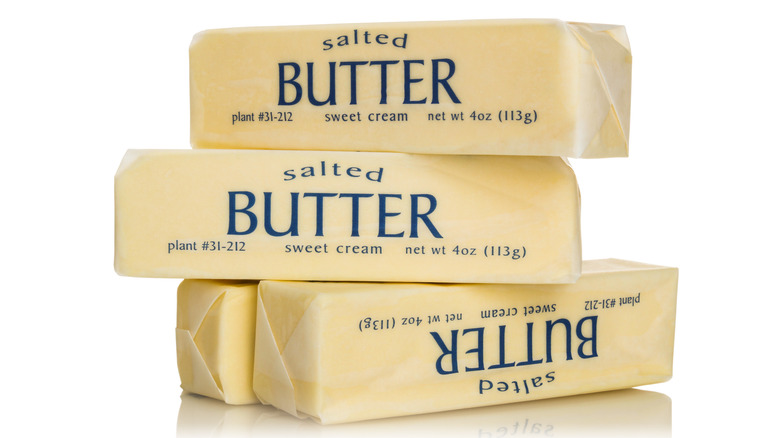The Fatty Ingredient That Can Prevent Cheese From Molding
It's always a disappointment when you head to the fridge to prepare a tasty dish or snack, only to find that the ingredients you bought for it have spoiled. If you've stored fresh, soft cheeses such as ricotta and feta, the high moisture levels make it the perfect breeding ground for fungus to appear if conditions are right. You can even find mold on hard cheeses that have been aged, though you might resort to scraping or slicing off the unsightly bits, which is a perfectly acceptable approach. But what if there was a way to stop that mold before it even forms? And a surprisingly easy way at that.
For hard cheeses, there's a useful trick you can use to keep these annoying growths from surfacing. Say you've found the best cheese for a cheeseboard, and you gather your chosen assortment together and begin carefully slicing and arranging each block. When you're finished and it's time to store your unused cheese, simply coat all the edges that you've sliced off with a light layer of salted butter, and you can be sure that the fatty spread will become a mold-resistant barrier. Butter is one dairy product that mildew can't easily grow on, even at room temperature, and it has everything to do with its uniquely high fat content.
Salted butter is the kind you should be using to preserve cheese
Butter, the magical ingredient that can enhance homecooked meals with slightly sweet, rich flavors, might owe its deliciousness to its fat content. Compared to the mere 3.5% fat levels contained in whole milk, butter has a whopping 80% fat content so that it spreads easily at the right temperature. The rest of it is mostly water. And even though mold and water are besties, when you coat your sliced cheese with butter, the fat volume trumps whatever microbes might be thinking about settling in.
Mold isn't a bacteria, but butter is great at repelling this type of unwanted growth, too. The FDA tested out butter's true shelf life by exposing it to various types of bacteria and returned three weeks later to discover that most of the bacteria they introduced to the butter had disappeared significantly. However, even though butter makes it tough for microbes to thrive, that doesn't eliminate the possibility of it spoiling due to other environmental factors. It's important to choose the right type of butter for the job. Salted butter will preserve your cheese even better than the unsalted kind because salt is a pro at preventing food from letting molds feed off its water contents.
As an additional precaution, be sure your refrigerator's temperature is set below 40 degrees Fahrenheit to inhibit mold's growth rate on your food. Refrigerated semi-soft cheeses will safely last for 2-3 weeks, while hard cheese can stay good for around 4-6 months, especially with a little added butter.

